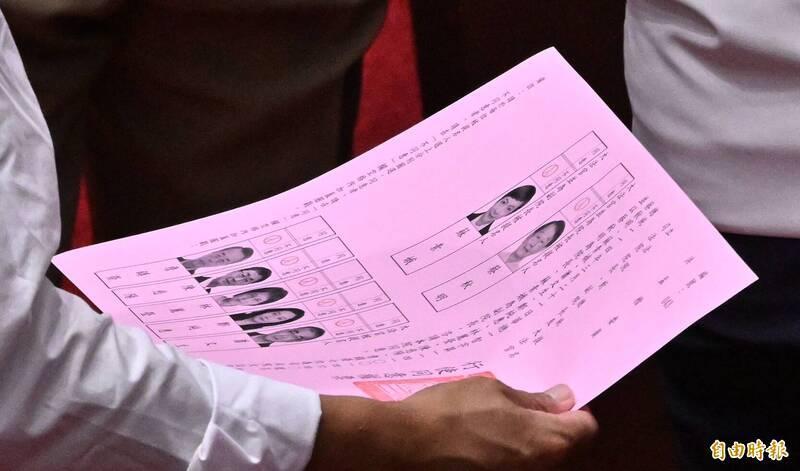The Legislative Yuan today rejected all seven grand justice nominees for the Constitutional Court, marking the second time lawmakers have rejected President William Lai’s (賴清德) picks.
Due to the combined majority held by the opposition parties, no nominee was able to pass the threshold of 57 votes to secure approval.
In the 113-seat legislature, the Chinese Nationalist Party (KMT) holds a majority of 54 seats together with two independent lawmakers, while the Taiwan People’s Party (TPP) has eight seats.

Photo: Liu Hsin-de, Taipei Times
The ruling Democratic Progressive Party (DPP) has 51 seats.
The KMT and TPP caucuses both vowed to reject all the nominees ahead of the vote.
Grand justices should be the last line of defense of the judiciary, KMT caucus whip Fu Kun-chi (傅崐萁) told reporters before the session.
After Lai took office, grand justices have superseded the legislature and made rulings that went against standard practices in all developed countries in the world, Fu said.
Some KMT lawmakers had reportedly considered approving one nominee, but decided not to out of concern that they would “listen to the DPP.”
DPP caucus chief executive Rosalia Wu (吳思瑤) called the opposition parties’ decision a “political maneuver.”
The delay in confirming the appointment of grand justices has made it difficult for the Constitution Court to operate normally, Wu said.
The KMT and the TPP should clearly state their reasons if they oppose the nominations, Wu said.
The nominees were selected by Lai on March 21.
They include High Prosecutors’ Office chief prosecutor Tsai Chiu-ming (蔡秋明) and Supreme Court judge Su Su-e (蘇素娥), who were nominated as president and vice president of the Judicial Yuan respectively, as well as grand justices.
Other nominees include Supreme Court judge Cheng Chun-hui (鄭純惠), High Prosecutors’ Office head prosecutor Lin Li-ying (林麗瑩), and law professors Hsiao Wen-sheng (蕭文生), Chen Tsi-yang (陳慈陽) and Chan Chen-jung (詹鎮榮).
Currently, only eight justices preside over the 15-seat court, after seven completed their terms at the end of October last year.
Justice Shieh Ming-yan (謝銘洋) is serving as the court's president.
Additional reporting by Liu Wan-lin

Chinese spouse and influencer Guan Guan’s (關關) residency permit has been revoked for repeatedly posting pro-China videos that threaten national security, the National Immigration Agency confirmed today. Guan Guan has said many controversial statements in her videos posted to Douyin (抖音), including “the red flag will soon be painted all over Taiwan” and “Taiwan is an inseparable part of China,” and expressing hope for expedited reunification. The agency last year received multiple reports alleging that Guan Guan had advocated for armed reunification. After verifying the reports, the agency last month issued a notice requiring her to appear and explain her actions. Guan

GIVE AND TAKE: Blood demand continues to rise each year, while fewer young donors are available due to the nation’s falling birthrate, a doctor said Blood donors can redeem points earned from donations to obtain limited edition Formosan black bear travel mugs, the Kaohsiung Blood Center said yesterday, as it announced a goal of stocking 20,000 units of blood prior to the Lunar New Year. The last month of the lunar year is National Blood Donation Month, when local centers seek to stockpile blood for use during the Lunar New Year holiday. The blood demand in southern Taiwan — including Tainan and Kaohsiung, as well as Chiayi, Pingtung, Penghu and Taitung counties — is about 2,000 units per day, the center said. The donation campaign aims to boost

The Kaohsiung Tourism Bureau audited six hotels in an effort to prevent price gouging ahead of Korean band BTS’ concert tour in the city scheduled for Nov. 19, 21 and 22 this year. The bureau on Friday said that the audits — conducted in response to allegations of unfair pricing posted on social media — found no wrongdoing. These establishments included the local branches of Chateau de Chine, Hotel Nikko, My Humble House, and Grand Hai Lai, it said, adding that the Consumer Protection Commission would have penalized price gougers had the accusations been substantiated. The bureau said the Tourism Development Act

A preclearance service to facilitate entry for people traveling to select airports in Japan would be available from Thursday next week to Feb. 25 at Taiwan Taoyuan International Airport, Taoyuan International Airport Corp (TIAC) said on Tuesday. The service was first made available to Taiwanese travelers throughout the winter vacation of 2024 and during the Lunar New Year holiday. In addition to flights to the Japanese cities of Hakodate, Asahikawa, Akita, Sendai, Niigata, Okayama, Takamatsu, Kumamoto and Kagoshima, the service would be available to travelers to Kobe and Oita. The service can be accessed by passengers of 15 flight routes operated by